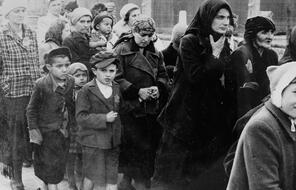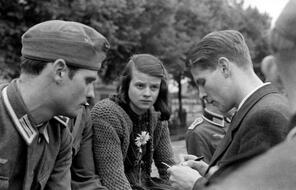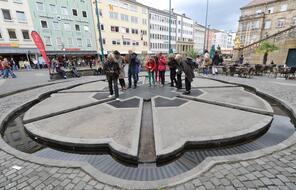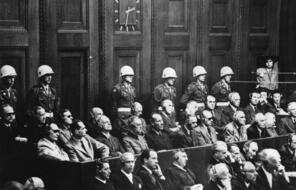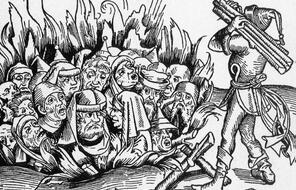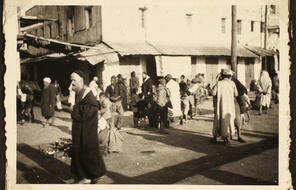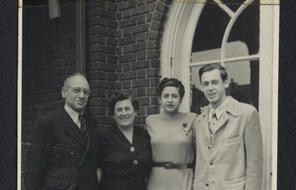The First Trial at Nuremberg
At a Glance
Language
English — USSubject
- History
- Social Studies
- Human & Civil Rights
- The Holocaust
Monsters and Men: The Nazis at Nuremberg
In November 1945, the trials began in Nuremberg. Robert Jackson, a justice of the US Supreme Court and a former US attorney general, was the chief American prosecutor for the trials. He had been appointed by Harry Truman, who had become president when Franklin Roosevelt died that April. Jackson opened the court proceedings with these words:
The privilege of opening the first trial in history for crimes against the peace of the world imposes a grave responsibility. The wrongs which we seek to condemn and punish have been so calculated, so malignant, and so devastating, that civilization cannot tolerate their being ignored because it cannot survive their being repeated. That four great nations flushed with victory and stung with injury stay the hand of vengeance and voluntarily submit their captive enemies to the judgment of law is one of the most significant tributes that Power has ever paid to Reason.
Justice Robert Jackson at Nuremberg
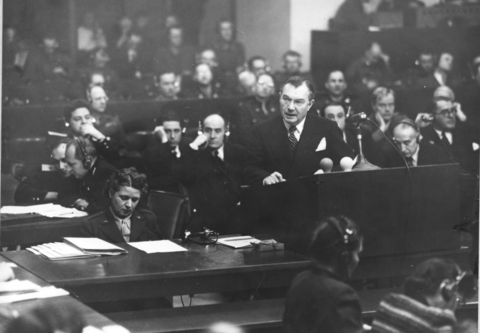
Justice Robert Jackson at Nuremberg
Justice Robert Jackson delivers his opening speech at the International Military Tribunal after World War II and the Holocaust, in December 1945.
What these men stand for we will patiently and temperately disclose. We will give you undeniable proofs of incredible events. . . . They took from the German people all those dignities and freedoms that we hold natural and inalienable rights in every human being. The people were compensated by inflaming and gratifying hatreds toward those who were marked as “scapegoats.” Against their opponents, including Jews, Catholics, and free labor, the Nazis directed such a campaign of arrogance, brutality and annihilation as the world has never witnessed since the pre-Christian ages. They excited the German ambition to be a “master race,” which of course implies serfdom for others. They led their people on a mad gamble for domination. They diverted social energies and resources to the creation of what they thought to be an invincible war machine. They overran their neighbors. To sustain the “master race” in its war-making, they enslaved millions of human beings and brought them into Germany, where these hapless creatures now wander as “displaced persons.”
Jackson went on to say,
Unfortunately, the nature of these crimes is such that both prosecution and judgment must be by victor nations over vanquished forces. The worldwide scope of the aggressions carried out by these men has left but few real neutrals. . . . We must never forget that the record on which we judge these defendants today is the record on which history will judge us tomorrow. To pass these defendants a poisoned chalice is to put it to our own lips as well. We must summon such detachment and intellectual integrity to our task that this Trial will commend itself to posterity as fulfilling humanity’s aspirations to do justice. 1
Of the 22 men brought to trial, five were military leaders and the rest were prominent German government or Nazi Party officials. The following is a list of the defendants and their positions in the Third Reich.
| Name | Title/position |
|---|---|
| Martin Bormann (tried in absentia) | Head of the Nazi Party Chancellery and Hitler’s private secretary |
| Karl Dönitz | Supreme Commander of the Navy (1943) and German Chancellor after Hitler’s suicide |
| Hans Frank | Governor General of Occupied Poland |
| Wilhelm Frick | Minister of the Interior |
| Hans Fritzsche | Head of the Radio Division of the Propaganda Ministry |
| Walther Funk | President of the Reichsbank (1939) and Reich Minister for Economic Affairs |
| Hermann Göring | Reich Marshall and Hitler’s chosen successor |
| Rudolf Hess | Deputy Führer |
| Alfred Jodl | Chief of the Operations Staff of the Armed Forces |
| Ernst Kaltenbrunner | Chief of the Security Police and the Reich Security Main Office |
| Wilhelm Keitel | Chief of the High Command of the Armed Forces |
| Konstantin von Neurath | Minister of Foreign Affairs (1932–1938) and Reich Protector of Bohemia and Moravia [regions of Czechoslovakia controlled by Germany] (1939–1943) |
| Franz von Papen |
Chancellor of Germany (1932) |
| Erich Raeder | Supreme Commander of the Navy (1928–1943) |
| Joachim von Ribbentrop | Reich Foreign Minister (1938–1945) |
| Alfred Rosenberg | Party Philosopher and Reich Minister for the Eastern Occupied Area |
| Fritz Sauckel | Plenipotentiary [Ambassador] for Labor Allocation |
| Hjalmar Schacht | Minister of Economics and President of the Reichsbank (1933–1939) |
| Baldur von Schirach | Führer [Leader] of the Hitler Youth |
| Arthur Seyss-Inquart | Minister of the Interior and Reich Governor of Austria |
| Albert Speer | Minister of Armaments and War Production |
| Julius Streicher | A Nazi Party leader and the founder of Der Stürmer, an antisemitic newspaper |
The Nuremberg trials addressed all German crimes associated with World War II together, not the Holocaust in particular. In fact, at the time, the concept of the Holocaust as we now know it did not yet exist. The targeting for annihilation of specific groups, such as Jews, Sinti, and Roma, was not yet recognized as the specific crime of genocide (see reading, Raphael Lemkin and the Genocide Convention in Chapter 11); therefore, what we now understand as the Holocaust was addressed at Nuremberg more broadly under the category of “crimes against humanity,” which included inhumane acts against any civilians.
As the trials proceeded, much of the evidence of the defendants’ crimes was provided by the Germans themselves, who had kept careful records of the war and the mass murders of Jews and others in reports, which were read in court. The final transcript of the proceedings was about 17,000 pages long. In addition, films of the killing centers and camps made by their Allied liberators were shown to the defendants and the tribunal judges.
All of the defendants, however, submitted pleas of not guilty, and throughout the trial, they vehemently denied responsibility for the crimes. They argued either that they had simply followed orders (although that defense had already been rejected in Article 8 of the tribunal’s charter) or that whatever actions they had carried out were done with no knowledge or awareness that they were contributing to the mass killings.
On October 1, 1946, after months of testimony, examination and cross examination of the defendants, and deliberation by the judges from the four Allied powers who presided over the trials, the verdicts were announced. Twelve defendants received the death sentence (Bormann, Frank, Frick, Göring, Jodl, Keitel, Kaltenbrunner, Ribbentrop, Rosenberg, Sauckel, Seyss-Inquart, and Streicher). Three were sentenced to life in prison (Hess, Funk, and Raeder). Four received prison terms ranging from 10 to 20 years (Dönitz, von Neurath, Schirach, and Speer). In general, the decisions for prison sentences rather than execution were made because the judges felt either that certain circumstances surrounding a defendant’s actions warranted a more lenient punishment or that the evidence was not strong enough to support a death penalty. The sentences were carried out with two exceptions: Göring died by suicide shortly before he could be executed, and Bormann remained missing.
Three of the defendants were acquitted—Schacht, von Papen, and Fritzsche. Schacht, who had been minister of economics, had played an important role in German rearmament in the 1930s, but there was no evidence that he had done so with the specific intention of waging war. There was no proof that von Papen, who had been the German chancellor before Hitler came to power, knew of Hitler’s intentions and his plans to wage aggressive wars. Fritzsche, who had worked under Goebbels in the propaganda ministry, had helped arouse popular sentiment in support of Hitler and the war, but that in itself was not considered to be a war crime. All three were released when the trials ended.
The conviction and death sentence for Julius Streicher was particularly noteworthy. Streicher was convicted neither of planning the war nor of war crimes but only on the charge of crimes against humanity. In issuing the verdict, the president of the tribunal explained how he and the other judges had determined Streicher’s guilt:
For his twenty-five years of speaking, writing, and preaching hatred of the Jews, Streicher was widely known as “Jew-Baiter Number One.” In his speeches and articles, week after week, month after month, he infected the German mind with the virus of antisemitism and incited the German people to active persecution. Each issue of Der Stürmer [the newspaper Streicher edited], which reached a circulation of 600,000 in 1935, was filled with such articles, often lewd and disgusting.
. . . As early as 1938 he began to call for the annihilation of the Jewish race. Twenty-three different articles of Der Stürmer between 1938 and 1941 were produced in evidence, in which the extermination [of Jews] “root and branch” was preached. . . . Other articles urged that only when world Jewry had been annihilated would the Jewish problem have been solved, and predicted that fifty years hence the Jewish graves “will proclaim that this people of murderers and criminals has after all met its deserved fate.” . . .
As the war in the early stages proved successful [in] acquiring more territory for the Reich, Streicher even intensified his efforts to incite the Germans against the Jews. In the record are twenty-six articles from Der Stürmer, published between August, 1941 and September, 1944, twelve by Streicher's own hand, which demanded annihilation and extermination in unequivocal terms. . . .
Streicher's incitement to murder and extermination at the time when Jews in the East were being killed under the most horrible conditions clearly constitutes persecution on political and racial grounds in connection with war crimes as defined by the Charter, and constitutes a crime against humanity. 2
The pronouncement of the sentences ended the trial. Twelve more trials, involving 190 defendants, were held at Nuremberg. But the first trial and the principles of international law that it established remained the most important. Judge Charles Wyzanski (see reading, Establishing the Nuremberg Tribunal), writing immediately after the trial ended, concluded:
[T]he outstanding accomplishment of the trial which never could have been achieved by any more executive action, is that it has crystallized the concept that there is inherent in the international community a machinery both for the expression of international criminal law and for its enforcement. 3
Connection Questions
- What words and phrases in Robert Jackson’s opening statement help you understand why he believed the Nuremberg trials were important? What did he mean when he said the trials are one of the most important tributes power has paid to reason?
- Some people at the time believed that the Nazis should be judged by neutral parties instead of by representatives from the countries that defeated Germany in the war. How did Jackson respond to this possible criticism of the tribunal? Is his response persuasive?
- The tribunal deliberately chose to prosecute the most prominent Nazi leaders in the first trial. Why might it have made that choice? Should other people who supported the Nazis have been brought to trial, even if they did not actively participate in the crimes?
- Why did the tribunal convict Julius Streicher and sentence him to death? Should individuals who spread messages of hatred be held accountable for the actions their words inspire?
- 1 Robert H. Jackson, “Opening Statement before the International Military Tribunal,” The Robert H. Jackson Center, accessed June 7, 2016.
- 2“Judgement: Streicher,” The Avalon Project (Yale Law School), accessed June 24, 2016.
- 3Charles E. Wyzanski, “Nuremberg in Retrospect,” Atlantic Monthly, December 1946, accessed June 23, 2016.
How to Cite This Reading
Facing History & Ourselves, "The First Trial at Nuremberg," last updated August 2, 2016.


